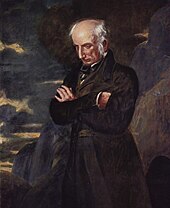William Wordsworth
Apariencia
(Redirigido desde «Wordsworth»)
| William Wordsworth | |||||||||||
|---|---|---|---|---|---|---|---|---|---|---|---|
 |
|||||||||||
| Véase también | |||||||||||
| Esta página contiene citas de una persona fallecida hace 174 años. | |||||||||||
William Wordsworth (Cockermouth, Inglaterra, 7 de abril de 1770 – Grasmere, Inglaterra, 23 de abril de 1850) fue un poeta romántico inglés.
Citas
[editar | editar código]- «El arte es expresión de los sentimientos y emociones del artista».[1]
- «El sufrimiento es permanente, desolador y oscuro, y comparte la naturaleza de la infinidad».
[Suffering is permanent, obscure and dark,
And shares the nature of infinity].[2]
- «La poesía es el rebosamiento espontáneo de sentimientos poderosos: tiene su origen en la emoción que se recoge con tranquilidad».
[Poetry is the spontaneous overflow of powerful feelings: it takes its origin from emotion recollected in tranquillity].[3]
- «Libertad o muerte para aquellos que hablamos la lengua que habló Shakespeare y tenemos la fe y moralidad que tenía John Milton».
[We must be free or die, who speak the tongue
That Shakespeare spake; the faith and morals hold
Which Milton held].[4]
- «¿No tengo razón cuando me lamento por lo que el hombre ha hecho del hombre?».[5]
Citas sobre el autor o su obra
[editar | editar código]- «Debemos estar muy agradecidos de que Wordsworth solo fuera poeta y no músico. ¡Imaginaos una sinfonía de Wordsworth! ¡Imaginaos tener que aguantar eso! ¡E imaginaos si hubiera compuesto fugas!».
[How thankful we ought to be that Wordsworth was only a poet and not a musician. Fancy a symphony by Wordsworth! Fancy having to sit it out! And fancy what it would have been if he had written fugues!].[6]
- «Tiene el aspecto de un hombre con quien no conviene hablar si no es para decir algo inteligente. Sin embargo, de vez en cuando conversa de forma alegre y ameno; y cuando uno llega a conocer el benévolo y excelente persona que es, esto le predispone a uno sentirse muy agradecido».
He looks like a man that one must not speak to unless one has some sensible thing to say. However he does occasionally converse cheerfully & well; and when one knows how benevolent & excellent he is, it disposes one to be very much pleased with him].[7]
Referencias
[editar | editar código]- ↑ A Narrow Girdle of Rough Stones and Crags, l. 37 (1803).[1]
- ↑ En The Borderers, 1842 Ratcliffe (2018), en línea.
- ↑ Lyrical Ballads, prefacio de la 2.ª ed., 1802. Citado en Oxford Essential Quotations, 6.ª ed.
- ↑ De It is not to be thought of that the Flood, 1807. Ratcliffe (2018).
- ↑ Bartra (datos.bne). Frases y citas célebres. Grijalbo. p. 332. ISBN 8425315263.
- ↑ Notebooks, ch. 8, 1912. Recogido por Susan Ratcliffe (2018), en línea
- ↑ En una carta de 1837. Ver: Further Letters of Joanna Baillie, pp. 180-181. Fairleigh Dickinson Univ Press, 2010. ISBN 9780838641491
Bibliografía
[editar | editar código]- Ratcliffe, Susan (2018). Oxford Essential Quotations, 6.ª ed. eISBN 9780191866692. Oxford University Press.
